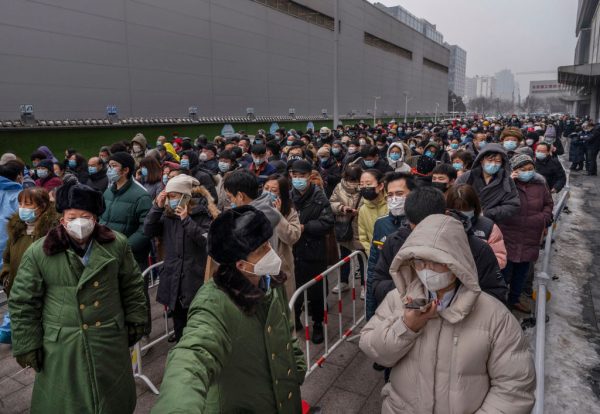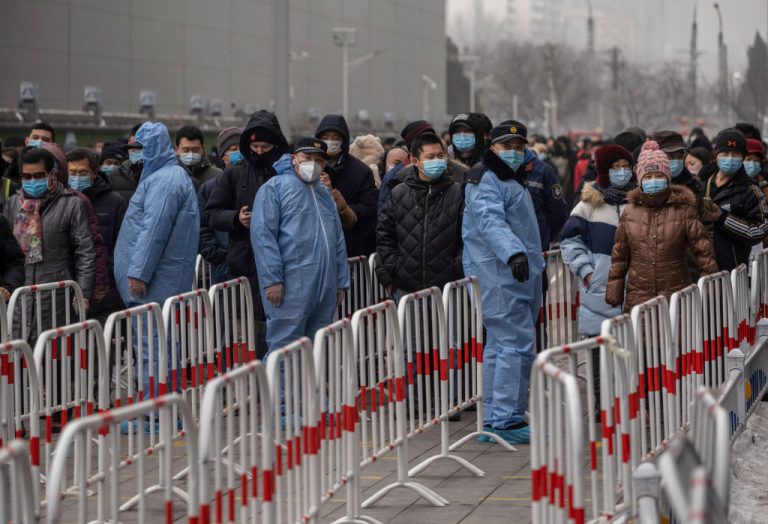Beijing’s “Olympic Bubble” has failed to stop the spread of the epidemic. The Beijing Organizing Committee reported on Jan. 23 that between Jan. 4 and 22, 72 of the 2,586 Olympic Games-related personnel had been tested for COVID-19, 33 of whom tested positive.
With only 10 days until the opening of the Beijing Winter Olympics, an outbreak has emerged in five districts in Beijing and is now spreading in multiple locations. Information on social media indicates that the military and police have taken over the Olympic venues. Some residents reported that armed police have been seen standing guard in the subway.
At present, Beijing authorities are on high alert. An independent journalist in Beijing tweeted on Jan. 22 that the Chinese military had taken over the Chongli district of Zhangjiakou, the main venue for the Beijing Winter Olympics snow events, and started patrolling, performing duties, and handling emergencies on Jan. 20.
The video shows many military vehicles driving on the road and the Beijing Winter Olympics theme song can be heard in the video.
Beijing’s Chaoyang district is a major host for the Winter Olympics. Mr. Wang, a resident of the district, told Epoch Times, an independent Chinese media outlet outside China, “There is an outbreak in our area. But on the surface, it doesn’t look like it. It looks quite relaxed. In reality, all of the residents are asked to take nucleic acid tests, and there is a big queue for it. I don’t know how many people are infected now.”
Success
You are now signed up for our newsletter
Success
Check your email to complete sign up
“People wearing red armbands are all over the streets, at all intersections and places of duty. When you go to the supermarket and the market, you have to scan the health code. People from other parts of the country are no longer allowed to enter (Beijing), and only those with nucleic acid certificates and vaccinations are allowed to enter. The migrant population has almost all been driven out (of Beijing),” said Mr. Wang.
According to China’s official media outlet, Xinjing News , on Jan. 23, four additional laboratories have been set up around the Olympic stadium in Chaoyang District, and the number of nucleic acid sampling sites in the region has increased to 140.

The Winter Olympics will be held in what is known as the “Olympic bubble.” Currently, international delegates, media personnel, and athletes associated with the Winter Olympics are arriving in Beijing and entering the “bubble.” Before entering China, these Olympic athletes must have proof of two negative PCR tests within 96 hours.
However, these precautions have failed to stop the spread of the epidemic. According to the Chinese Communist Party’s epidemic prevention regulations, those who test positive must be isolated in their rooms until they are tested again and become negative.
Currently, there are outbreaks in five districts in Beijing, including Fengtai, Fangshan, Daxing, Chaoyang, and Xicheng. The Fengtai district, which is adjacent to the main venues of the Beijing Winter Olympics such as the Bird’s Nest and the Water Cube, is the most serious and has been designated as a high-risk area.
A lawyer who lives in Fengtai District told Epoch Times, “On January 22, Yihai Garden in Fengtai District, where I live, has been sealed off and people and vehicles are allowed to enter only. The current policy is that residents can go downstairs, but they can’t leave the community. It is because there are cases of infection in the neighborhood.”
Mr. Guo, a resident of Fengtai, told Epoch Times that a case was found in the neighborhood of Dongdan Old Palace, and the area was closed off. One building was so severe that residents weren’t even allowed to leave the building.
Mr. Guo also revealed that as the Winter Olympics are approaching, Beijing is tightening its control. “I took the subway to work and saw armed police standing guard in the subway,” he said.
Dong Guangping, a former mainland activist, told the media that the authorities know the outbreak can’t be controlled, “With such a large population in Beijing, Omicron is spreading very quickly and the vaccine is not working, so the key is how to get through the Olympic period safely.”
Despite the outbreak getting serious in Beijing, Dong said the Communist Party will not lock down the city like Xi’an and Wuhan because that would ruin the image the CCP has been working so hard to build for the Olympics.
According to Dong, “Beijing is tight on the inside and loose on the outside, with strict internal control, strict blockade, strict control. But the outside world can’t see the fear and anxiety,” he said.














